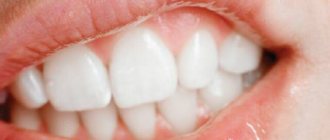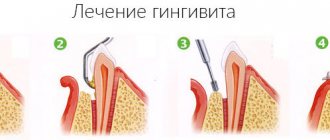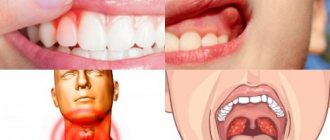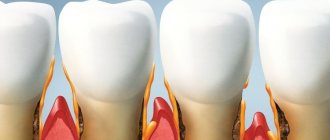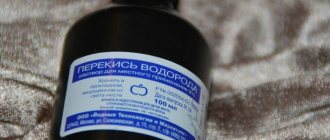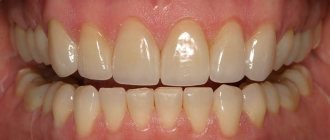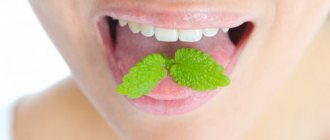Bad breath and even bad breath can often be caused by gum problems. Masking an unpleasant odor with chewing gum or special oral sprays does not solve the problem, but only aggravates it.
In addition to the obvious discomfort that a person experiences during a conversation or even at rest, the problem of bad breath can serve as a signal of the presence of quite serious diseases in the body. A timely visit to the dentist is a guarantee of successful treatment and prevention of possible complications.
Causes of unpleasant odor from gums
To eliminate foreign odors from the oral cavity, it is necessary to identify the cause of this phenomenon. Most often, stench appears as a result of obvious problems with the gums, which can arise as a result of various factors.
Reference! The provoking factor of an unpleasant odor is the appearance and intensive proliferation of pathogenic microorganisms, which in the process of vital activity release fetid sulfur compounds.
Local
A local or local factor is the proliferation of microorganisms in the oral cavity itself. This process occurs for a number of reasons:
- Poor gum care. If a person does not follow the basic rules of oral care, then the mouth becomes a source of accumulation of harmful bacteria. If a person does not brush his teeth at least 1-2 times a day, then food debris begins to accumulate on the teeth and gums, which rots and settles in the form of plaque. This is where the stench comes from.
- Failure to maintain proper hygiene for dental structures. If a person has braces, mouth guards or dentures on their teeth, they must be properly cared for. Otherwise, the growth of pathogenic microflora on the gums cannot be avoided.
- Taking certain medications. Bad breath may occur as a result of consuming large quantities of certain potent medications. In this case, we can talk about temporary discomfort, which stops immediately after discontinuation of therapeutic drugs.
- Not regular tongue care. Even if a person brushes his teeth every day and rinses his gums well, but forgets to clean the surface of his tongue with a toothbrush, then over time bacteria will inevitably colonize his oral cavity.
Dental diseases
The group of dental factors that cause bad breath includes:
- caries;
- plaque on the gums;
- tartar;
- inflammation of the gums (gingivitis);
- inflammation in the periodontium, spreading to the gums and forming purulent contents in the dental-gingival cavity (periodontitis);
- inflammation of the mucous membrane (stomatitis);
- severe damage to periodontal tissue (periodontal disease);
- “dry mouth” syndrome, in which a small amount of saliva is produced and the gums are not properly cleansed with it.
General factors
All other causes of unpleasant odor can be summarized as follows:
- Unbalanced diet. The presence in the diet of large quantities of meat and dairy products, as well as other protein foods, leads to an imbalance in the acid-base balance in the body. As a result, a favorable environment for harmful bacteria is formed. Bad breath symbolizes the processes of decay occurring in the gastrointestinal tract.
- Internal diseases. Some people mistake gum problems as the cause of bad breath, although this process is directly related to some pathological processes occurring in the digestive tract, liver, lungs and other internal organs.
It is important to know! With rhinitis and sinusitis, microorganisms enter the oral cavity through the nasopharynx and provoke inflammation of the gums. It is these diseases that often cause a rather fetid odor emanating from the gums.
- Hormonal imbalance. When hormonal levels are disrupted, the structure of saliva changes. It becomes more viscous and loses its original ability to cleanse the gums of bacteria accumulated on them.
- Addiction to cigarettes. Combustible substances penetrate through the mouth into the lungs and settle not only in this organ, but throughout their entire route. When these substances get on the teeth and gums, they multiply, resulting in a rather characteristic unpleasant odor.
Causes
Bleeding gums and an unpleasant odor - this may be a sign of such common diseases as:
- leukemia (blood cancer);
- blood clotting disorder;
- heart failure;
- gastrointestinal diseases (gastritis, peptic ulcer);
- hormonal imbalances, which are often observed during puberty, pregnancy and menopause;
- vitamin deficiency C and the resulting increased permeability of vascular walls;
- diabetes;
- HIV;
- taking medications that change blood clotting or the permeability of blood vessels.
Local factors also cause bleeding gums:
- The presence of fixed dentures (crowns) or poor-quality fillings that create conditions for food to get stuck between the teeth.
- Crowded teeth and malocclusions.
- Gingivitis is a gum disease that can be local and generalized (covering the entire gingival margin).
- Periodontitis is an inflammation of not only the gums, but also the bone tissue of the alveolar process, in which the tooth sockets are located; This inflammation leads to loosening of the teeth.
- Hard plaque (tartar), which mechanically detaches the soft gum tissue from the tooth root, causing bleeding.
Dense stone occurs due to:
- features of the mineral composition of saliva;
- metabolic disorders;
- insufficient self-cleaning of teeth when eating only soft, thermally processed food - vigorous chewing of dense food cleanses the teeth and massages the gums;
- insufficient cleaning of teeth with an individual toothbrush.
Colonies of bacteria support inflammation and cause odor
Causes of bleeding:
| Common reasons | Local factors |
|
|
Associated symptoms
Unpleasant gum odor can be accompanied by a number of characteristic symptoms. Initially, a person notices their bleeding: every time he brushes his teeth, he spits out bloody water.
This symptomatology is caused by the extensive proliferation of bacteria, which adversely affects the structure of the gums.
They begin to swell, a decent amount of fluid accumulates inside, and because of this, the vessels become brittle. Every time you brush your teeth, as well as when biting into hard foods, your gums are injured and blood flows out of them. Later, plaque begins to appear on the teeth.
First, it covers the inside of the lower front teeth, and then the outside. The roughness on the enamel can be easily felt with the tip of the tongue. Later, the plaque turns into a stony structure, some parts of which can break off from the walls of the teeth.
Reference! Some patients complain of burning and discomfort in the gums. Upon examination, the dentist may detect swelling and redness. In the most advanced cases, the gums increase in size and change their shade to bright blue. Lumpiness and thickening of the gum tissue also indicates inflammation.
Effective against bad breath and gum inflammation
Unpleasant breath odor is not only an aesthetic problem, causing inconvenience in communicating with others, but also indicating the development of oral diseases.
This symptom can be caused by both dental problems and progressive gum diseases.
In dentistry, there is a special term - halitosis, which is used to refer to a repulsive, rotten odor from a person’s mouth.
Causes
An unpleasant odor from the gums, as a rule, indicates the development of inflammatory diseases affecting soft tissues. Among them, the most common are:
- gingivitis (bumps on the gums);
- periodontitis;
- stomatitis.
Gingivitis is a disease characterized by inflammation of the marginal part of the gums and intergingival papillae. It is accompanied by redness, swelling and swelling of the soft tissues.
A distinctive feature of gingivitis is bleeding gums, which occurs not only during brushing, but also at rest.
In addition, in some forms of the disease, the appearance of uncharacteristic plaque or ulcers (open wounds) on the gums may occur.
The main cause of gingivitis is a pathological increase in the number of harmful bacteria as a result of poor oral care. Accumulating on the surface of the teeth, they irritate the gums, thereby causing inflammation. The unpleasant odor is caused by waste products of microorganisms and small food particles.
Periodontitis affects the connective tissue of the gums and teeth. It often occurs as a complication after untreated gingivitis. Periodontitis is characterized by the appearance of painful and uncomfortable sensations in the gum area, their bleeding and swelling.
There is also pathological exposure of the dental necks and the formation of pockets. Often the inflammatory process during periodontitis leads to the gums festering, and this provokes an unpleasant odor of breath.
The danger of periodontitis is that when the connective tissues are severely damaged, the teeth become loose, which can lead to their further loss.
Stomatitis is a disease that dentists can easily identify after the first examination. It is characterized by the following symptoms:
- the formation of ulcers on the gums, which can spread to the surface of the cheeks or tongue;
- severe pain that makes eating difficult;
- the presence of small bubbles on the gums filled with clear or yellowish liquid;
- the appearance of a white dense coating, which is very difficult to remove on your own.
Along with these external signs, a person’s temperature rises and their overall health significantly worsens. If stomatitis is left untreated for a long time, soft tissue necrosis may begin, which leads to the gums smelling rotten.
Traditional treatment
To get rid of bad gum odor, you need to contact a specialist to determine the causes of the problem and further prescribe the correct treatment. Traditionally, drug therapy is used for gingivitis, stomatitis or periodontitis, which shows good results in a short time.
Based on the fact that unpleasant odor from gums, as a rule, occurs as a result of the proliferation of pathogenic microorganisms, doctors prescribe antibiotics that have a detrimental effect on them. But it is important to understand that these drugs inhibit the development of not only harmful bacteria, but also beneficial ones, therefore, in order to avoid dysbacteriosis, you should take lacto and bifido complexes with them.
In addition, you need to choose the right products for local treatment of gums. For example, with candidal stomatitis, when the oral cavity is covered with a whitish coating, it is necessary to use drugs that suppress the development of fungi. For gingivitis and periodontitis, you can use Chlorhexidine, Miramistin or other local antiseptics.
To eliminate the odor during treatment or make it less noticeable, you need to use professional (SPLAT) toothpaste or tooth powder to brush your teeth, rinse your mouth at least 5 times a day and be sure to floss. At the same time, it is important to take care of the integrity of the gums and avoid damaging them with a brush that is too hard.
Traditional methods
Traditional medicine methods can be used to strengthen gums and combat unpleasant, painful symptoms. The following tools are suitable for this:
- A decoction of oak bark is indispensable for eliminating bleeding gums due to its tannic and astringent properties. To prepare it, you need to first rinse 2 tablespoons of oak bark under running water, then pour boiling water over it and boil for 15 minutes. After the liquid has cooled, you can rinse;
- a solution of soda and salt - relieves swelling, redness, and eliminates pain. To prepare a solution, dilute a teaspoon of salt and soda in warm boiled water, and then rinse your mouth at least 5 times a day;
- Eucalyptus oil – has disinfecting properties. It is used both for direct application to the affected areas of the gums and for preparing solutions. In addition to its therapeutic effect, this remedy also helps to freshen breath;
- herbal infusion – relieves inflammation, relieves unpleasant symptoms, and disinfects. For preparation, you can use medicinal chamomile, sage, mint and other plants with similar properties. The herbs are crushed and poured with boiling water for half an hour, after which they are carefully filtered and used for rinsing.
Prevention
To prevent the appearance of unpleasant gum odor, you should take care of your oral health and follow basic hygiene rules.
In addition to regularly brushing your teeth, do not forget about preventive visits to the dentist. Also remember that smoking and excessive alcohol consumption negatively affects the condition of the gums, causing them to become diseased.
If your gums smell bad, you need to start treatment immediately to avoid complications.
source
Ask a question: Cancel reply
Source: https://aptekacheboksary.ru/vospalenie/effektivnoe-ot-zapaha-vo-rtu-pri-vospalenii-desen/
How is this symptom diagnosed?
To find out the exact cause of the unpleasant odor from the gums, you need to consult a specialist. The doctor will conduct a comprehensive diagnosis using instrumental and clinical examination.
Sometimes additional consultation with a specialized specialist and additional tests are required.
The dentist examines the exhaled air and gives an assessment of the degree of complexity of the disease , and also provides a preliminary consultation on the rational treatment of gums.
An examination of the oral cavity is required: the condition of the teeth, mucous membranes of the oral cavity, tongue, gums is assessed, and atrophic and hyperplastic processes are identified. Determining the cause of gum odor is often carried out using the bacteriocytological method: the microflora of the oral cavity is studied and the migration of leukocytes is determined.
Attention! Hygienic and periodontal indices, Schiller-Pisarev tests (the color of gum glycogen changes its structure during chronic inflammation), stomatoscopy (a morphological study of biopsy material is carried out) are used as special research methods.
Prevention
Since gingivitis in most situations is considered as a preliminary stage of periodontitis, preventive measures for such diseases are carried out in virtually the same ways.
It is necessary to adhere to the rules of hygiene:
- Oral hygiene. When brushing your teeth daily, you need to be mindful of your tongue and the gum area between your teeth. The procedure should last at least 2-5 minutes. Particular emphasis should be placed on the teeth that are located in the back of the mouth, since plaque and accumulation of microbes form there. You need to brush your teeth after eating.
- To avoid the risk of inflammation and bleeding gums, you need to balance your diet. Consume products that contain sufficient amounts of vitamins and minerals. Thanks to this, it is possible to strengthen the gums and reduce the persistence of bad breath.
- Regular visits to a specialist. Observations and therapy at the dentist will make it possible to prevent the formation of periodontal disease and detect it at the initial stage.
- Quitting bad habits (tobacco smoking, alcohol abuse).
If you have bad breath and your gums are bleeding, you should immediately contact a specialist. This symptomatology indicates the presence of a disease such as gingivitis.
Timely therapy can prevent adverse consequences and eliminate the disease as soon as possible.
How to get rid of it?
Treatment to eliminate unpleasant odor from gums is carried out comprehensively. It is necessary not only to take the medications prescribed by your doctor, but also to change your habits and also review your diet. Cleaning the mouth and tongue is necessary at least 2 times a day.
Food should be balanced and not contain excess sugar. Special antimicrobial agents and applications to the gums are prescribed. The doctor recommends rinsing your mouth after every meal, as well as at every opportunity.
In case of severe bleeding of the gums, they are treated with antiseptic agents and medications. A severe inflammatory process accompanied by pain should be cured by taking anti-inflammatory drugs.
To remove plaque in hard-to-reach places, as well as to remove tartar, special cleaning of the gums and teeth is carried out:
- Laser cleaning. A special laser heats plaque and rocky formations. Due to the warm effect, everything unnecessary is removed from the enamel surface.
- Ultrasound cleaning. Removal of everything unnecessary from the oral cavity occurs due to the influence of high-frequency sound vibration.
- Dental cleanings. Plaque is removed using special pastes and electric brushes with special hooks.
- " Air Flow ". Cleaning is carried out by exposing the affected areas to a jet of compressed air together with a special solution.
Treatment with folk remedies
- A decoction of oak bark “knits” and strengthens the mucous membrane. Helps from the first use, stops bleeding. Rinse 3 times a day. Course – 14 days. Sold in a pharmacy.
- Chamomile tincture disinfects and heals wounds. Buy it at the pharmacy or prepare it yourself. Place two large spoons of flowers on a glass of boiling water. Leave for 20 minutes. Rinse 2 times a day.
- Nettle stops bleeding.
- Aloe regenerates tissue. Grind the aloe leaves, let it brew for 60 minutes, add the same amount of water, and boil. The rinse solution is ready.
- Horseradish reduces pain in the mouth.
- Sage relieves swelling and relieves pain. Rinse until you get better.
- Water pepper tincture stops bleeding and reduces gum inflammation.
- Apple cider vinegar kills bacteria. Helps fight bleeding and gum inflammation. Dilute in the following proportion: 30 ml vinegar – 200 ml water.
- To stop bleeding, rinse your mouth with salt water. A teaspoon of salt per 200 ml of water. Helps fight bacteria.
- Apply an ice cube and the bleeding will stop.
Maintain hygiene, carefully monitor your health, do not develop diseases, visit the dentist on time - then bleeding gums will be avoided. Fresh breath will delight those around you.
Prevention methods
In order to avoid problems with gums and not experience discomfort due to bad breath, you must adhere to the following recommendations:
- Carry out regular and complete oral hygiene. Don't forget to brush your teeth morning and evening, and if possible, after every meal. During cleaning, you need to massage your tongue with a brush.
Attention! You should thoroughly clean the inner surface of the teeth and hard-to-reach places; to do this, it is advisable to massage the gums for at least 3 to 4 minutes. Regularly rinse your mouth with clean water or herbal decoctions.
- Eat properly. The diet should consist of a variety of foods, and you should not overeat. You should try to eat sweets and flour in minimal quantities. The main source of vitamins and microelements should be the consumption of fruits and vegetables. Chewing solid food is a good preventative for teeth and gums.
- Visit the dentist at least once a year. Only a specialist will be able to identify the presence of certain gum diseases at the earliest stages of development.
- To refuse from bad habits. Tobacco smoking and alcohol abuse leads to the formation of plaque, creates a pathogenic environment in the oral cavity, makes breath not fresh, and sometimes even foul.
Treatment
When gums bleed and there is bad breath, they resort to general and local methods of treatment.
General therapy
So:
- General treatment is aimed at strengthening blood vessels and reducing gum swelling. Patients are prescribed medications containing ascorbic acid - vitamin C. Ascorutin, which contains two active ingredients, has an excellent effect:
- vitamin C, which improves metabolism in the gums and seals vascular walls;
- vitamin P (rutin), which enhances the effect of ascorbic acid.
- When common diseases are detected, the patient needs drug treatment of the identified pathology according to the prescriptions of the relevant specialist.
- A diet high in calcium and phosphorus promotes rapid gum recovery. Including raw fruits and vegetables in the diet increases the useful load on the periodontal tissues, and additional massage occurs.
Local therapy
The main therapeutic measures are carried out in the form of local effects on the gums. If your gums are bleeding and your breath smells, there is an algorithm for how to treat the inflammation.
- First of all, it is necessary to eliminate soft dental plaque and calculus - supragingival and subgingival. Until the gum pockets are cleared of tartar, no remedy will relieve bleeding and bad breath. The stone is removed under anesthesia:
- manually - with special tools (excavators, hooks);
- laser or ultrasonic scalers.
Tartar removal
- Along with the stone, granulations are also removed - loose, easily bleeding tissues that grow profusely around the neck of the tooth.
- A therapeutic bandage is applied to the gum - this is the name of artificial dentin, to which anti-inflammatory agents are added; it is mixed into a thick paste and applied to the gum margin and between teeth to promote healing of the soft tissue. Aerosols or sprays can be used to relieve inflammation.
- The patient is taught rational techniques for brushing teeth and massaging the gums (with a toothbrush and fingers).
- The doctor recommends a toothbrush of the required hardness - usually, at the beginning of treatment, a brush with soft bristles is used, then they switch to medium-hard bristles, and when restoring the gums, you need to switch to a hard toothbrush to ensure a good massage of the gums.
- Toothpaste is also selected by the dentist depending on the clinical picture. Usually recommended -
- Lacalut aktiv;
- Lacalut fitoformula;
- Parodontol Active;
- Parodontax F;
- PresiDENT exclusive;
- Asepta
- Aseptapod (“Healthy Gums”);
- Forest balm.
- After brushing your teeth, you need to treat the oral cavity with a special rinse to destroy pathogenic microflora in the mouth and prevent inflammation.
- Balms are applied to the gums to prevent the resumption of bleeding and the appearance of odor:
- Metrogyl Denta is an antiseptic and antibiotic.
- Asepta - freshens breath, reduces bleeding, destroys germs.
- Cholisal - eliminates inflammation, destroys germs, relieves pain.
- Kamistad - reduces inflammation, relieves pain, accelerates gum regeneration (healing).
The price of these drugs ranges from 150-350 rubles per package, which lasts for a long time. The instructions for each drug give an idea of the rules for its use.
The video in this article talks about the correct technique for brushing your teeth.
Useful video
In the video you will see how to get rid of bad breath:
The unpleasant odor emanating from the gums causes a lot of trouble both to the person himself and to the people around him. At the first feeling of discomfort, you should immediately visit the dentist.
Using professional methods, a doctor will be able to rule out serious diseases or, conversely, make an accurate diagnosis if they exist. Timely treatment, as a rule, brings positive results, and the person gets rid of the foreign odor emanating from him when breathing.
General factors
The unpleasant odor that comes from the gums can also be influenced by other circumstances that are not local or dental:
- Unbalanced diet. The smell is affected by the consumption of meat, fermented milk or other products that contain a large amount of protein. During processing, compounds are formed that change the acid-base balance within the body. This environment is optimal for harmful bacteria. Carbohydrate foods have no effect on bad breath.
- Somatic (internal) diseases. An unpleasant odor, mistakenly interpreted by the patient himself as coming from the gums, can be provoked by certain pathological processes in the digestive system, lungs, liver or other organs. Microorganisms that cause sinusitis or rhinitis can enter the oral cavity through the nasopharynx and cause inflammation of the gums.
- Hormonal imbalance. Changes in the content of sex hormones affect the characteristics of saliva. It will become more viscous and partially lose its properties. This can also affect the proliferation of microorganisms between the teeth, on the oral mucosa and the space between the gums.
- Tobacco smoking. During the combustion of the contents of a cigarette, substances penetrate into the oral cavity, which begin to be deposited on the teeth and gums and already have an unpleasant odor.
In addition, smoke contributes to overdrying of the mucous membrane, disrupting the process of its self-cleaning, and also reduces the oxygen content, which is a favorable condition for anaerobic microorganisms.
Tobacco smoking is involved in the deposition of plaque, the formation of tartar and inflammatory processes of the gums.
Causes of pathology
The occurrence of an unpleasant odor is associated with the characteristics of the oral cavity, in particular, with its temperature and humidity. They are ideal for the development of pathogens, which are activated for two main reasons. The first is the body’s usual reaction to the accumulation of pathogenic waste products between the teeth during sleep. To get rid of unpleasant morning breath, just do a standard cleaning.
The second reason, called halitosis, is a pathology and occurs under the influence of such factors:
- Insufficient oral hygiene, which leads to the accumulation of food particles and their subsequent decomposition on the surface of the teeth and gums.
- Respiratory diseases accompanied by acute inflammatory processes.
- Systemic diseases of the body, which include diseases of the kidneys, liver and other organs in a chronic form.
- Pathological dryness of the oral cavity, which occurs as a complication due to the use of certain medications, with chronic mouth breathing, or due to the characteristics of the professional activities of speakers, teachers, and lawyers.
- Smoking and regular consumption of products with a strong odor are also causes of difficult-to-eliminate bad breath.
- Mechanical damage to soft tissues, leading to the formation of purulent wounds.
- Acute, but more often chronic dental diseases are stomatitis, gingivitis, periodontitis, periostitis.
Read also: What does a cyst look like on a dental image?
Note! The source of odor from gums in diseases of the oral cavity becomes a concomitant symptom of these pathologies - blood clots in which bacteria actively multiply.
It is important to determine the cause of bad odor correctly
Traditional methods of getting rid of odor
Treatment can be trusted to folk recipes. To remove bad breath, our ancestors chewed coriander fruits, roots and leaves of parsley, rinsed the mouth with wormwood tincture, mint tea and calamus infusion.
Traditional healers offer other options:
- Infusion of calendula, chamomile and St. John's wort flowers, wormwood shoots. These plants are poured with a glass of boiled water, infused for half an hour, after which you should rinse your mouth with the tincture several times a day.
- A decoction of oak bark, which is filled with water and boiled over low heat. The resulting product is carefully filtered, after which it is used to rinse the mouth in the same way as the previous product.
- A solution of salt or soda is the most commonplace recipe, the use of which on a regular basis allows you to get rid of the root cause of the unpleasant odor - inflammatory processes in the gum tissue.
Read also: Gums bleed during pregnancy, what to do
Oak bark is used as a decoction
It should be understood that the use of folk recipes makes sense only in cases where the root cause of the odor is not serious dental diseases or general problems with the body. In the last two cases, it is not decoctions and rinses that can help, but timely medical assistance.
Only a dentist can remove crowns or prescribe a course of treatment for severe periodontitis.

